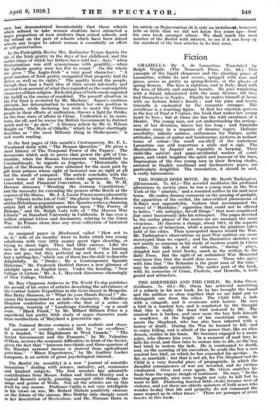THE SHEPHERD AND THE CHILD. By John Owen. (Gollanez. 7s.
6d.)—Mr. Owen has achieved something of a miracle in his new book, for he has brought the banal and the sublime so close together that we are hard put to distinguish one from the other. The Child kills a lark with a catapult, and is overcome with horror. He sees a bird In a musical box, and is comforted by the thought that this is really the dead bird restored to life. The musical box is broken, and once more the boy feels himself a murderer. At the height of his emotional crisis, lie meets the Shepherd, who has also been infected with a horror of death. During the War he learned to kill, and to enjoy killing, and is afraid of the power that, like an alien demon, resides in his brain. He becomes engaged to a rustic minx, who throws him over.' In a moment of mad fury he kills his' rival, and then tries to restore him to life, as the boy had tried to restore the lark. He is condemned to death, and, on the morning of his execution, he sends the boy a new musical box bird, on which he has expended his savings. So far, so mawkish : but that is not all, for The Shepherd and the Child is a very forceful piece of propaganda, in which the dreadful consequences of war are revealed, and its victims vindicated. Over and over again, Mr. Owen snatches his book from the sugary slough of sentiment. He says, " In the training grounds, men, were taught not only to kill but to want to kill. Fluttering hearted little clerks became men of violence and yet there are elderly spinsters of both sexes who wonder io-day that life and property do not command the same respect as in other times." There are passages of great
beauty-in this book. • •






































 Previous page
Previous page